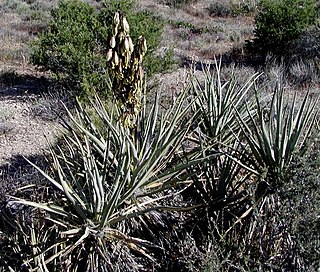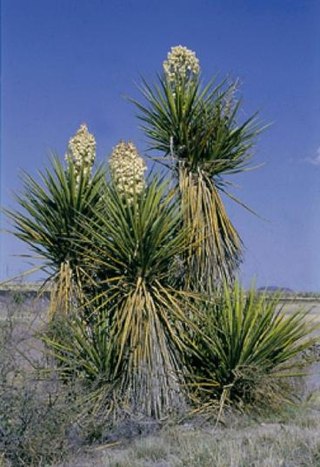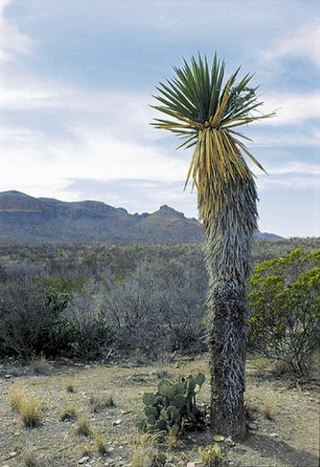
Yucca is a genus of perennial shrubs and trees in the family Asparagaceae, subfamily Agavoideae. Its 40–50 species are notable for their rosettes of evergreen, tough, sword-shaped leaves and large terminal panicles of white or whitish flowers. They are native to the Americas and the Caribbean in a wide range of habitats, from humid rainforest and wet subtropical ecosystems to the hot and dry (arid) deserts and savanna.

Yucca brevifolia is a plant species belonging to the genus Yucca. It is tree-like in habit, which is reflected in its common names.

Yucca baccata is a common species of yucca native to the deserts of the southwestern United States and northwestern Mexico, from southeastern California north to Utah, east to western Texas and south to Sonora and Chihuahua. It is also reported in the wild in Colombia.

Yucca elata is a perennial plant, with common names that include soaptree, soaptree yucca, soapweed, and palmella. It is native to southwestern North America, in the Sonoran Desert and Chihuahuan Desert in the United States, southern Nevada, southwestern Utah, and northern Mexico. Yucca elata is widely distributed, although its population appears to be decreasing.
The Prodoxidae are a family of moths, generally small in size and nondescript in appearance. They include species of moderate pest status, such as the currant shoot borer, and others of considerable ecological and evolutionary interest, such as various species of "yucca moths".

The Lower Colorado River Valley (LCRV) is the river region of the lower Colorado River of the southwestern United States in North America that rises in the Rocky Mountains and has its outlet at the Colorado River Delta in the northern Gulf of California in northwestern Mexico, between the states of Baja California and Sonora. This north–south stretch of the Colorado River forms the border between the U.S. states of California/Arizona and Nevada/Arizona, and between the Mexican states of Baja California/Sonora.

Yucca glauca is a species of perennial evergreen plant, adapted to xeric (dry) growth conditions. It is also known as small soapweed, soapweed yucca, Spanish bayonet, and Great Plains yucca.

Yucca faxoniana is a bladed evergreen shrub of the genus Yucca. It is known by the common names Faxon yucca,Spanish dagger, and giant dagger.

Yucca × schottii is a plant species in the genus Yucca, native to southern Arizona, southwestern New Mexico, and the northern parts of Sonora and Chihuahua. The common names are Schott's yucca, hoary yucca, and mountain yucca. The "×" in the name indicates that this is a nothospecies, regarded as being a natural hybrid between two other species. In this case, Yucca × schottii is believed to have originated as a hybrid between Y. baccata and Y. madrensis. Yucca × schottii is firmly established and does reproduce freely in the wild.
Parategeticula is a genus of moths of the family Prodoxidae, one of three genera known as yucca moths; they are mutualistic pollinators of various Yucca species.
Parategeticula elephantipella is a moth of the family Prodoxidae. It is found on the eastern slopes of the Sierra Madre Oriental in Veracruz, Mexico.
Parategeticula martella is a moth of the family Prodoxidae. It is found in southern Coahuila, Mexico.
Parategeticula tzoyatlella is a moth of the family Prodoxidae. It is found in the southern Mapimí area of the Chihuahuan Desert in Mexico.
Tegeticula carnerosanella is a moth of the family Prodoxidae. It is found from western Texas in the United States south to Mexico. The habitat consists of shrub desert.
Tegeticula corruptrix is a moth of the family Prodoxidae. It is found in North America in south-western California, Arizona, New Mexico, northern Coahuila, western and southern Texas, Colorado, Alberta, the western plains of Nebraska, Wyoming and Montana.
Parategeticula ecdysiastica is a moth of the family Prodoxidae. It is found in the Sierra de la Laguna Mountains of the Cape region of Baja California, Mexico
Prodoxus y-inversus is a moth of the family Prodoxidae. It is found in the United States in south-western New Mexico, south-eastern Arizona and southern Nevada. The habitat consists of shrubby desert and open forests.

Yucca carnerosana, commonly known as the giant Spanish dagger, is a species of North American plant in the asparagus family that grows in arid and desert climate areas. In the United States, it is confined to only a few counties in western Texas, where endemic populations are found in rocky outcrops. The species is, however, widely distributed in northern Mexico. It has a wide range and is abundant, and although it has local threats, its population appears to be stable overall.

Yucca aloifolia is the type species for the genus Yucca. Common names include aloe yucca, dagger plant, and Spanish bayonet. It grows in sandy soils, especially on sand dunes along the coast.

The Meseta Central matorral is a deserts and xeric shrublands ecoregion in north-central Mexico.










